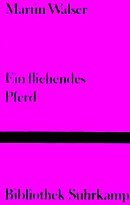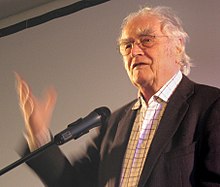Martin Walser
He published a trilogy of novels about the character Anselm Kristlein, beginning with Halbzeit in 1960, Das Einhorn (The Unicorn) in 1966 and ending with Der Sturz (The Fall) in 1973.
Most of his major works have been translated into English, including the 1978 novella Runaway Horse, which was successful with both readers and critics.
His acceptance speech for the Peace Prize caused controversy with Walser's remarks on German commemoration of the Holocaust.
Walser is regarded, along with Heinrich Böll, Günter Grass, and Siegfried Lenz, as one of Germany's most influential postwar authors.
[6] Walser denied that he knowingly entered the party, and assumed that he was enrolled by a garrison commander as part of a larger group without his knowledge.
[6] The claim was disputed by Hans-Dieter Kreikamp from the German Federal Archives, who said that a personal signature was formally required, even in times of war.
[1] While studying, Walser worked as a reporter for the Süddeutscher Rundfunk broadcasting company, and wrote and directed his first audio plays.
[3] Beginning in 1953, Walser was regularly invited to conferences of the Group 47, which was focused on literature for a new democratic Germany.
Like his later books, it was set in Southern Germany in a postwar society, and satirically portrayed the "conservative middle class" during the "so-called economic miracle".
It was both a commercial and a critical success, and was described as "Walser's most beautiful and mature book and a masterful, searing critique of society".
According to Walser, a key reason for the switch was the lack of active support by Suhrkamp during the controversy over his novel Tod eines Kritikers [de] (Death of a Critic).
[12] Walser's subjects were often broken heroes who found it difficult to live up to the requirements of society or their own expectations.
[13] Some of them feature in a permanent exhibition at the Literaturmuseum der Moderne in Marbach, including Ein springender Brunnen.
[8] The novel caused a scandal, especially in view of Reich-Ranicki's Jewish heritage and Walser's former membership in the Nazi Party.
Frank Schirrmacher, editor of the FAZ, refused to print an advance excerpt in the paper, as had traditionally been done for Walser's books.
[4][5] During the late 1960s, Walser, like many German left intellectuals, including Günter Grass, supported Willy Brandt for chancellor of West Germany.
[5] In the 1960s and 1970s, Walser moved further to the left and was considered a sympathizer of the DKP, the newly formed West German Communist Party.
In 1988 he gave a series of lectures titled "Speeches about One's Own Country" in which he made clear that he considered the division of Germany a painful and intolerable gulf.
[17] German journalist Jakob Augstein is Walser's son from a relationship with translator Maria Carlsson.
[26] Some days after the event, and again on 9 November, the 60th anniversary of the Kristallnacht pogrom against German Jews, Bubis accused Walser of "intellectual arson" (geistige Brandstiftung)[1] and claimed that Walser's speech was both "trying to block out history or, respectively, to eliminate the remembrance" and pleading "for a culture of looking away and thinking away".






